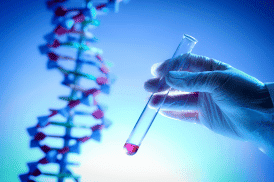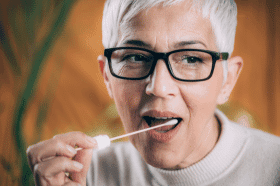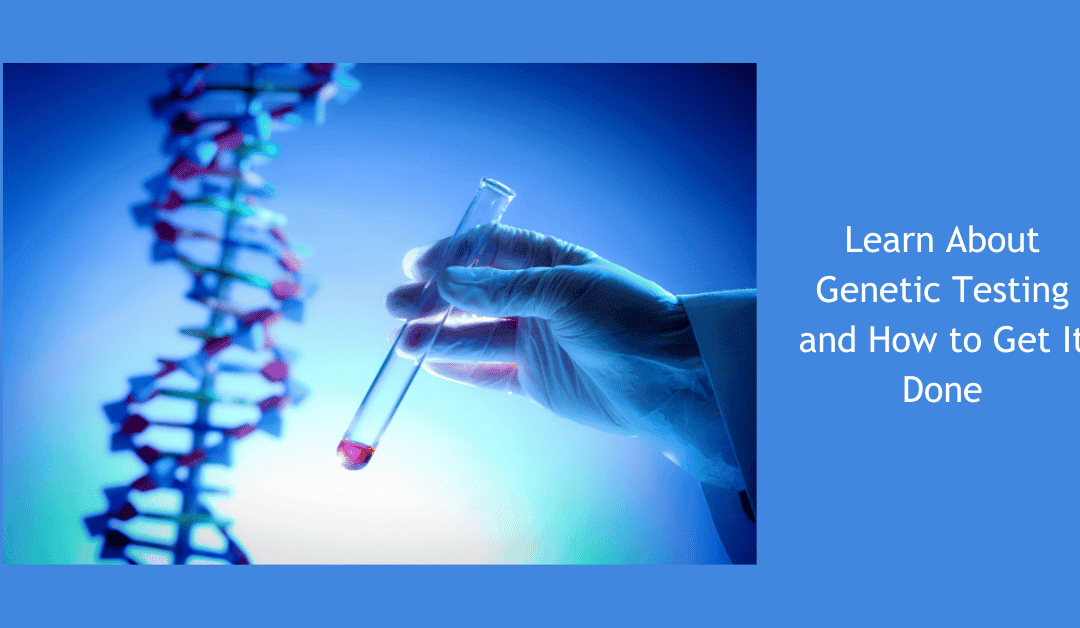You may worry that having cancer could mean your children will get cancer too. Cancer itself is not passed down (inherited) from parents to children. But a genetic change (mutation) that increases the risk (possibility) of cancer can be passed down if it is present in a parent’s egg or sperm cells. While most cancer is due to random chance or environmental risk factors, up to 10% of all cancers may be caused by inherited genetic changes.
If a person inherits a genetic change from a parent, it does not mean they will definitely get cancer, but the risk (chances) is higher. It also means that their parents, children, and brothers and sisters have a 50% chance of having the same genetic change and a higher risk of getting cancer. Their blood relatives on that side of the family (mother’s side or father’s side) like aunts, uncles and cousins may also have the same genetic change. Genetic testing for hereditary cancer can help a family to learn which, if any, relatives have a higher chance of getting cancer. It can also bring relief when there is no inherited cancer in the family.
children, and brothers and sisters have a 50% chance of having the same genetic change and a higher risk of getting cancer. Their blood relatives on that side of the family (mother’s side or father’s side) like aunts, uncles and cousins may also have the same genetic change. Genetic testing for hereditary cancer can help a family to learn which, if any, relatives have a higher chance of getting cancer. It can also bring relief when there is no inherited cancer in the family.
Even when there is no gene mutation found in a family, sometimes cancer is more common than expected. This is called familial cancer, and happens in up to 20% of all cancers. It is not known why familial cancers happen. Some possible reasons are unknown genetic risk factors not yet included on genetic testing or lifestyle or environmental factors shared by multiple family members.
If you have been diagnosed with cancer or have a family history of cancer, genetic testing may be useful to find out if hereditary cancer is in the family. Genetic testing can give your family members useful knowledge about their health so they can take steps to lower their risk of getting cancer through lifestyle changes, health screenings, and other medical care recommended by their doctor. Ask your doctor if genetic testing is appropriate for your family’s situation.
Genetic Testing
Genetic testing does not prevent or treat cancer. It is a laboratory test that looks for changes (mutations) in a person’s genes that could help:
- Show if they have a higher risk for certain cancers.
- Learn if this increased risk could be passed to children or other family members.
- Change medical care, including knowing better about when to screen for cancer, and how frequently.
Genetic testing does not say if someone has cancer, or that they are guaranteed to have cancer. But it can tell you if you have a higher risk than most people.
Testing is usually done with a small sample of blood, but it can sometimes be done with saliva, cells from inside the cheek, or skin cells. It will usually take several weeks to get the results.
Not everyone needs to get genetic testing. Ask your doctor if this type of testing could benefit you and your care.
Making Decisions About Genetic Testing
To decide if genetic testing is recommended for you, your doctor will have a conversation with you to understand your risk and your family’s history with cancer. They will ask you for important details such as which blood relatives were diagnosed with cancer, their age at diagnosis, and what kinds of cancer they had. Some people feel uncomfortable discussing their family members’ health with others, but keep in mind that your healthcare team wants to help and honor you and your family.
 Based on the family health information you explain to your doctor, a genetic counselor can be very helpful. A genetic counselor is a healthcare professional with specialized training in genetics and counseling to support patients wanting more information about how inherited conditions might affect them or their families. Genetic counselors also explain the meaning of genetic test results in the context of a patient’s family history, and help patients and their families understand this information. They will describe the genetic testing in detail, including the pros and cons of testing, and exploring psychosocial implications of genetic testing before you make this personal decision. If testing is done, they can explain what the results mean for you and for your family.
Based on the family health information you explain to your doctor, a genetic counselor can be very helpful. A genetic counselor is a healthcare professional with specialized training in genetics and counseling to support patients wanting more information about how inherited conditions might affect them or their families. Genetic counselors also explain the meaning of genetic test results in the context of a patient’s family history, and help patients and their families understand this information. They will describe the genetic testing in detail, including the pros and cons of testing, and exploring psychosocial implications of genetic testing before you make this personal decision. If testing is done, they can explain what the results mean for you and for your family.
Cancer can be very overwhelming and knowing that there is a chance that it runs in your family can be difficult. To begin with, you did not cause your cancer, and getting cancer is not your fault or anyone else’s fault. It is important to take it one step at a time and remember that there are professionals who can help you and your family with your concerns.
If you are tested, keep a copy of your report to find out what tests were given and what the results were. Keep this as part of your permanent health record.
Additional Resources
Find genetic counselors | https://findageneticcounselor.nsgc.org/
Learn which cancers have genetic tests | https://www.cancer.net/navigating-cancer-care/cancer-basics/genetics/genetic-testing-cancer-risk
Frequently asked questions about genetic testing | https://www.cancer.gov/about-cancer/causes-prevention/genetics/genetic-testing-fact-sheet
How to get genetic testing | https://www.facingourrisk.org/info/hereditary-cancer-and-genetic-testing/how-to-get-testing/where-to-get-testing


Recent Comments